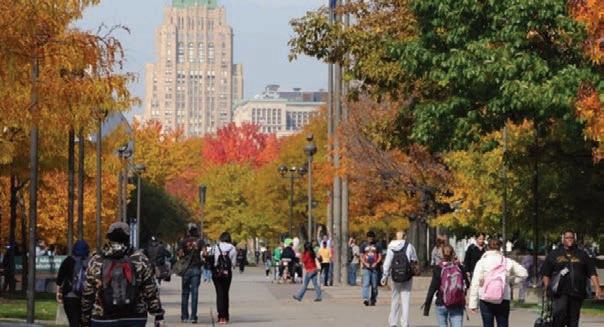
7 minute read
POPULATION
is at a crossroads” and for a half-century “has fallen behind other states in population growth, jobs, earnings, health, educational achievement, and the quality of public services at the state and local levels,” driving well-educated younger workers to move and work elsewhere.
“It doesn’t bode well for economic opportunities in the state to want to stay here because there’s opportunities for them to have the job (in another state) that’s going to give them the quality of life that they want,” said Eric Lupher, president of the Citizens Research Council. “It’s something that we have to get our arms around to return to the prosperities that we had decades ago.” e reports detail how Michigan’s population growth has lagged the nation since the 1970s and o er what Lupher calls a “wake-up call that we’re trending in the wrong direction.” e Citizens Research Council reports cite long-term projections from the University of Michigan Research Seminar in Quantitative Economics that predict the state’s overall population will continue to grow slower than the rest of the nation for years to come and then start to decline in the 2040s if present trends are not reversed.
Advertisement
Michigan ranks 50th among all states and the District of Columbia with just 1% population growth from 2000 to 2020, ahead of only 51st-ranked West Virginia, which recorded a 1% decline over the two-decade period.
To reverse the trend, Michigan needs new approaches to retain and attract a younger generation of residents, and it needs to draw more people from other states and other nations to replenish its labor force as older workers retire, Lupher said.
“ e fact that our population isn’t growing at a healthy pace has a relationship on the economy, and so
POP’S HANI
From Page 3
“As the sandwich grew in popularity and became a bigger part of the menu, there began to be some rumblings about opening a restaurant centered around the Hani,” Giftos said. “During COVID, every restaurant brand across the country was trying to gure out ways to downsize its footprint, and suck some labor and complexity out of the equation, while staying relevant.
“ e location on Woodward presented itself. We thought if we were going to try this, we wanted to try it in a place that had a good chance of succeeding and the Woodward location checked all the boxes.”
Pop’s Hani took over a 2,800-squarefoot space that housed Kalamata Greek Grill, which closed in November. e space has seating for 30-35 guests and has a sta of 15 employees, all of whom are new hires. No employees have been moved from any National Coney locations, Giftos said.
About 60% of the new restaurant’s business comes by way of takeout and delivery orders, Giftos told Crain’s.
Opening the Hani-focused restaurant cost about $200,000, signi cantly
The Citizens Research Council of Michigan Inc. reports warn that Michigan “has fallen behind other states in population growth, jobs, earnings, health, educational achievement, and the quality of public services at the state and local levels,” driving well-educated younger workers to move and work elsewhere. |
WAYNE STATE UNIVERSITY
A tale of two trends
The expansion of Michigan’s retirement age population is projected to far outpace growth trends in the working age population, according to projections from the University of Michigan Research Seminar in Quantitative Economics.
being a manufacturing state,” Lupher said. e state needs to put more emphasis on improving K-12 education to prepare students for careers, funding higher education and improving infrastructure, as other states that have surpassed Michigan have done successfully.
“ ere’s a carry forward: ‘ is is the way we’ve always done it, so this is the way we’ll continue to do it.’ Other states are doing it di erently and we’re getting left behind. Collectively, those states are ahead of Michigan or surpassing Michigan because of our inertia and stagnancy. ey’re investing in themselves. ey’re investing in their people and trying to create a quality place to live and where people want to be.
“In a big way, Michigan’s determination to be a low-tax state has precluded us from making those sort of investments.” e Citizens Research Council notes that while “clearly tax competitiveness matters … so does providing a quality of place and an investment in people to make young Michigan residents want to stay and to attract young people from other states and other nations.”
Lately, Michigan has been o ering and awarding billions of dollars in tax incentives and assistance to land facilities to produce batteries and electric vehicles as the auto industry electri es. Lupher asserts that investing in education, public health and infrastructure will do more to help the state’s economy in the long term.
COVID-19 pandemic, new businesses accounted for all of the state’s net job growth. e 128,369 jobs that new companies created more than o set the 108,131 jobs that were lost when established businesses either closed or downsized.
“In the big picture, Michigan’s entrepreneurial environment is a strength relative to other Midwest neighbors, but the Midwest generally lags behind the nation as a whole,” according to the Citizens Research Council. “Public policies that encourage and empower entrepreneurial e orts, especially for females and minorities who have traditionally been less likely to create new businesses in Michigan, would help Michigan further improve in this area and ensure that all entrepreneurial talent is being e ectively fostered.” does the economy a ect the fact that people aren’t coming here,” he said.
Regardless of how Michigan proceeds in addressing these pressing issues, Lupher hopes leaders avoid the so-called “Michigan 180,” where strategies change every four or eight years with a change in administrations in Lansing.
“Good ideas already exist in government, philanthropy, the private sector, and communities around the state. However, for far too long, the political divisiveness that has plagued public discourse has either kept these ideas from being implemented or caused e orts to be abandoned as political winds shift,” authors of the research reports wrote in a summary.
“If we want to grow our economy and we want to attract the top talent from around the nation to be part of our state, we have to be looking at the jobs of the future and opportunities for higher wage and high skill (jobs) to move our economy forward and grow again as a state.”
Low-tax strategy inhibits crucial investments
rough 2030, Michigan’s working age population of 18- to 64-year-olds will decline, then grow slowly by just 0.7% through 2050, all while the population 65 and older grows 30%, ac- cording to University of Michigan projections. e demographic shift will “make it more di cult for Michigan employers to nd workers to ll key positions, particularly in areas like health care where an aging population will increase demand for services,” according to the Citizens Research Council.
Michigan’s labor participation rate also ranks in the bottom 10 nationally “and long-term forecasts suggest it will not improve over the coming decades,” the report’s authors wrote. at information “tells us that complacency and relying on the practices of yesteryear isn’t working anymore and we can’t stay relying on less than what is needed to open a National Coney Island location, Giftos said.
Some expansion of the new brand could be in the plans, Giftos said, but he and other National Coney executives are taking a wait-and-see approach.

“I think we’re going to look at the results here, compare it to things on the National Coney Island front and how the future shapes up,” he said. “We’ll check some metrics and make that call from there.”
Giftos said the new venture comes as challenges remain in the restaurant industry. Some in ationary pressures have leveled o or stabilized, but price increases have led consumers to pick and choose how they spend their money. Giftos said his companies aren’t rushing to raise menu prices, though.
“It’s certainly a challenge. I think it’s a challenge across the whole restaurant industry,” he said. “We try to watch our costs and proceed accordingly. I think consumers are at a point now where they’re watching a lot closer where they spend their money and how much they spend.”
Giftos would not share speci cs, but said National Coney Island samestore year-over-year and month-
“It’s a di erent strategy that lifts the whole economy, not just di erent aspects of it,” he said.
Entrepreneurial bright spot
One strength the Citizens Research Council cites is that Michigan ranks highly compared to other Midwest states in new business formations, which plays “a critical role in supporting the economy.”
As of 2020, rms that had been in business at least 11 years supported nearly seven out of 10 jobs in the state. About 17% of jobs were at companies that had been in business for ve years or less, according to the Citizens Research Council data.
In 2020, the rst year of the over-month sales have increased in recent years. ose gures haven’t reached pre-pandemic levels, though. e early returns from Pop’s Hani Shop have Giftos excited about the future. e two reports the Citizens Research Council issued on population and demographic trends and the state’s workforce and talent are the rst of ve papers examining issues the state faces. Reports coming out this summer will look at the health of the state’s population; infrastructure, the environment and climate; and state and local governments. ere was a time that I didn’t know how long that would last in the capacity it has. e day we turned on delivery through DoorDash, we had orders owing in and we made no announcement about it. ings are changing.”
“We’re seeing a bit of a dynamic shift across the restaurant industry,” Giftos said. “Delivery is a huge thing.
In issuing the two reports on Michigan’s economic and workforce challenges and its changing demographics, the Citizens Research Council wants to create greater awareness and recognition about the “big picture” issues, Lupher said.
“If we want to return to prosperity, then we have to do something about it,” he said.
Contact: jason.davis@crain.com (313) 446-1612; @JayDavis_1981









